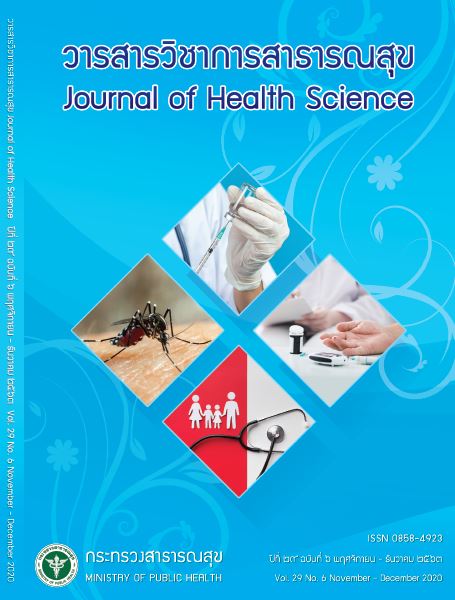The Effect of Moringa oleifera Lam. Leaves Extract on IL-6 in Inflammatory Human Macrophages Induced by Lipopolysaccharide
Keywords:
cytokine, Moringa oleifera, macrophage, lipopolysaccharide, anti-inflammationAbstract
Inflammation is a result of immune mechanism response to foreign organism and infection. It causes by pro-inflammatory cytokines released from the immune system such as tumor necrotic factor-α (TNF-α), interleukin (IL)-1β and IL-6. Non-steroidal anti-inflammatory drugs (NSAIDS) and steroid are the most common drugs for inflammation treatment. However, using of this medication can cause side effects. The objective of this study was to investigate the anti-inflammatory property of Moringa oleifera leaves extract on human monocyte-derived macrophages induced by lipopolysaccharide of Gram-negative bacterial cell wall. Gene expression of IL-6 was evaluated by quantitative reverse transcription polymerase chain reaction. IL-6 was measured by enzyme-linked immunosorbent assay. The results indicated that post-treatment of inflamed cell with Moringa leaves extract significantly reduced both IL-6 gene expression and IL-6 cytokine level (p<0.05) compared to the control groups. This study demonstrated that Moringa oleifera leaves extract reduced IL-6 in macrophages induced by lipopolysaccharide. This plant should be further investigated and the knowledge could be applied for the development of anti-inflammation drugs.
Downloads
References
Kokkas B. Tissue injury and inflammation. Ann Gen Psychiatry 2010;9(Suppl 1):S1.
Muangnoi C, Chingsuwanrote P, Praengamthanachoti P, Svasti S, Tuntipopipat S. Moringa oleifera pod inhibits inflammatory mediator production by lipopolysaccharide-stimulated RAW 264.7 murine macrophage cell lines. Inflammation 2012;35(2):445-55.
Hussein SZ, Mohd Yusoff K, Makpol S, Mohd Yusof YA. Gelam honey attenuates carrageenan-induced rat paw inflammation via NF-kappaB pathway. PloS One 2013;8(8):e72365.
Grivennikov SI, Greten FR, Karin M. Immunity, inflammation, and cancer. Cell 2010;140(6):883-99.
Balkwill F, Charles KA, Mantovani A. Smoldering and polarized inflammation in the initiation and promotion of malignant disease. Cancer Cell 2005;7(3):211-7.
Xiao H, Yang CS. Combination regimen with statins and NSAIDs: a promising strategy for cancer chemoprevention. Int J Cancer 2008;123(5):983-90.
Sostres C, Gargallo CJ, Arroyo MT, Lanas A. Adverse effects of non-steroidal anti-inflammatory drugs (NSAIDs, aspirin and coxibs) on upper gastrointestinal tract. Best Pract Res Clin Gastroenterol 2010;24(2):121- 32.
Warrington TP, Bostwick JM. Psychiatric adverse effects of corticosteroids. Mayo Clin Proc 2006;81(10):1361- 7.
Kou X, Li B, Olayanju JB, Drake JM, Chen N. Nutraceutical or pharmacological potential of Moringa oleifera Lam. Nutrients 2018;10(3):343.
Menon V, Thomas R, Ghale AR, Reinhard C, Pruszak J. Flow cytometry protocols for surface and intracellular antigen analyses of neural cell types. J Vis Exp 2014;94:e52241.
Kooltheat N, Sranujit RP, Chumark P, Potup P, Laytragoon-Lewin N, Usuwanthim K. An ethyl acetate fraction of Moringa oleifera Lam. inhibits human macrophage cytokine production induced by cigarette smoke. Nutrients 2014;6(2):697-710.
Vaidya A, Nasarabadi S, Milanovich F. Optimization of RNA purification and analysis for automated, pre-symptomatic disease diagnostics. Livermore, CA: Lawrence Livermore National Lab; 2005.
Rao X, Huang X, Zhou Z, Lin X. An improvement of the 2^(-delta delta CT) method for quantitative real-time polymerase chain reaction data analysis. Biostat Bioinforma Biomath 2013;3(3):71-85.
Khor KZ, Lim V, Moses EJ, Abdul Samad N. The in vitro and in vivo anticancer properties of Moringa oleifera. Evidence-based Complementary and Alternative Medicine 2018;2:1-14.
Abd Rani NZ, Husain K, Kumolosasi E. Moringa genus: a review of phytochemistry and pharmacology. Frontiers in Pharmacology 2018;9(108):1-26.
Mansour M, Mohamed MF, Elhalwagi A, El-Itriby HA, Shawki HH, Abdelhamid IA. Moringa peregrina leaves extracts induce apoptosis and cell cycle arrest of hepatocellular carcinoma. Bio Med Res Int 2019:1-13.
Liu T, Zhang L, Joo D, Sun SC. NF-kappaB signaling in inflammation. Signal Transduction and Targeted Therapy 2017;2:1-9.
Arulselvan P, Tan WS, Gothai S, Muniandy K, Fakurazi S, Esa NM, et al. Anti-inflammatory potential of ethyl acetate fraction of Moringa oleifera in downregulating the NF-kappaB signaling pathway in lipopolysaccharide-stimulated macrophages. Molecules 2016;21(11):1- 11.
Tan WS, Arulselvan P, Karthivashan G, Fakurazi S. Moringa oleifera flower extract suppresses the activation of inflammatory mediators in lipopolysaccharide-stimulated RAW 264.7 macrophages via NF-kappaB pathway. Mediators of Inflammation 2015;2015:1-11.
Downloads
Published
How to Cite
Issue
Section
License

This work is licensed under a Creative Commons Attribution-NonCommercial-NoDerivatives 4.0 International License.







